仁爱科普版中考英语一轮复习九上Unit 1 Topic 1课件(共66张PPT)
文档属性
| 名称 | 仁爱科普版中考英语一轮复习九上Unit 1 Topic 1课件(共66张PPT) |  | |
| 格式 | zip | ||
| 文件大小 | 4.8MB | ||
| 资源类型 | 试卷 | ||
| 版本资源 | 仁爱科普版 | ||
| 科目 | 英语 | ||
| 更新时间 | 2020-12-15 09:38:15 | ||
图片预览

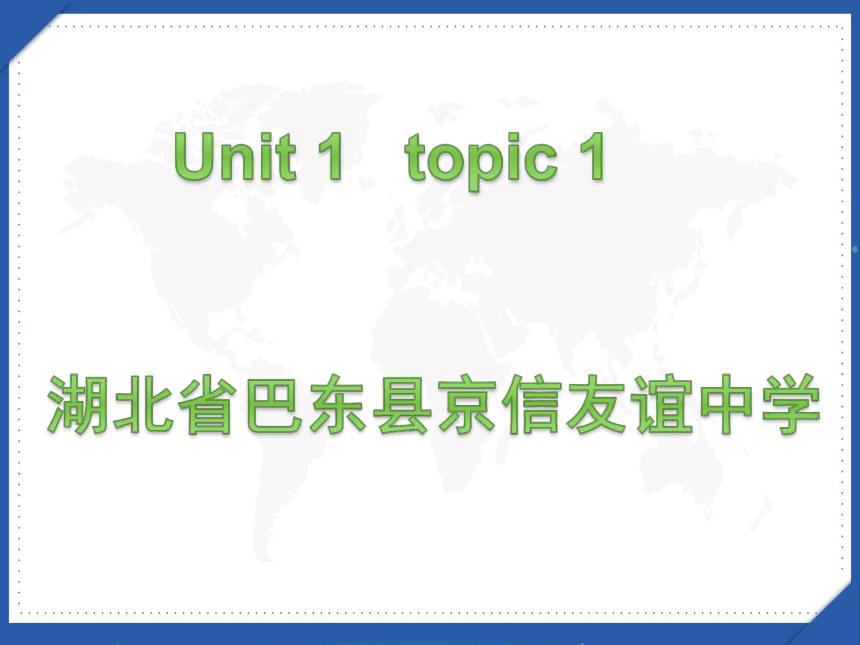
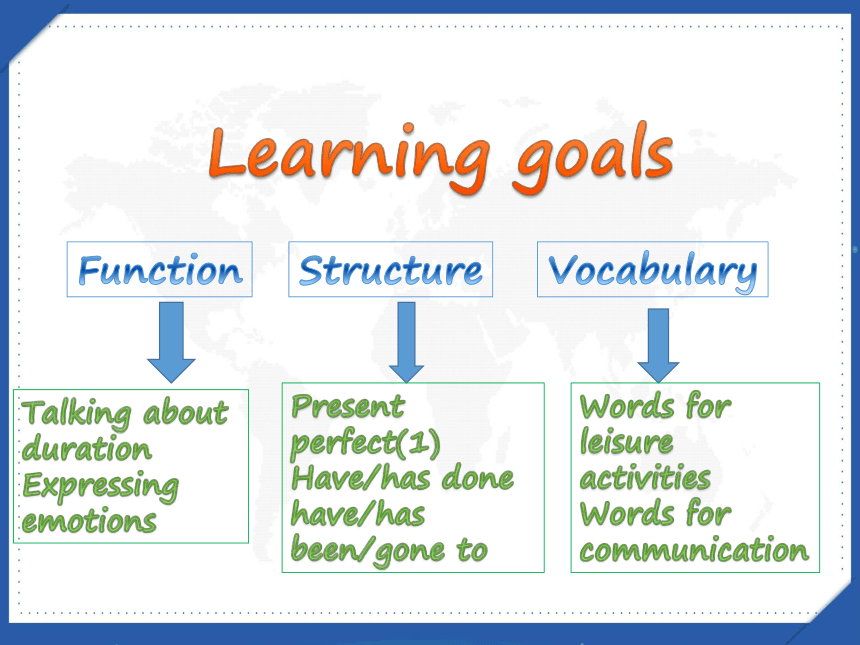

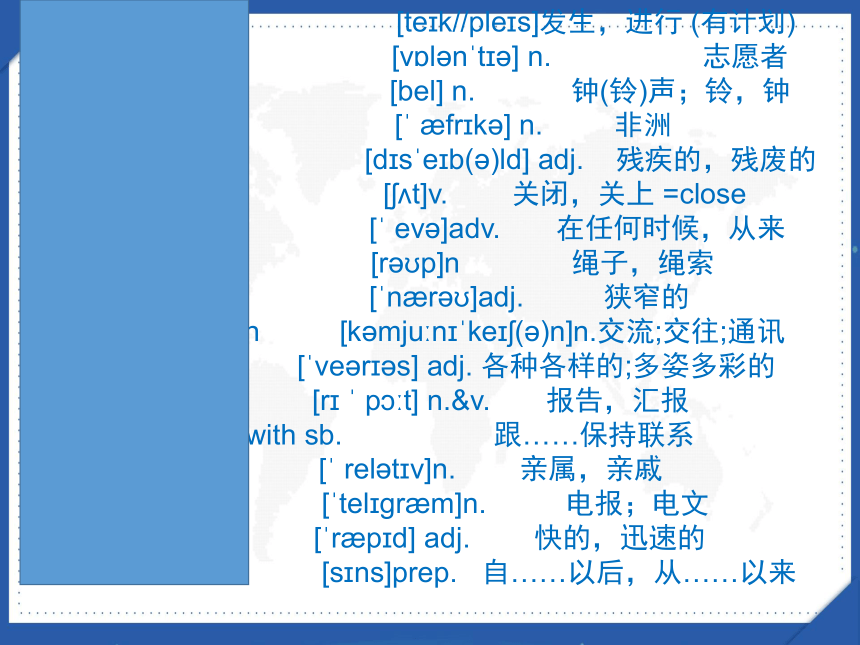
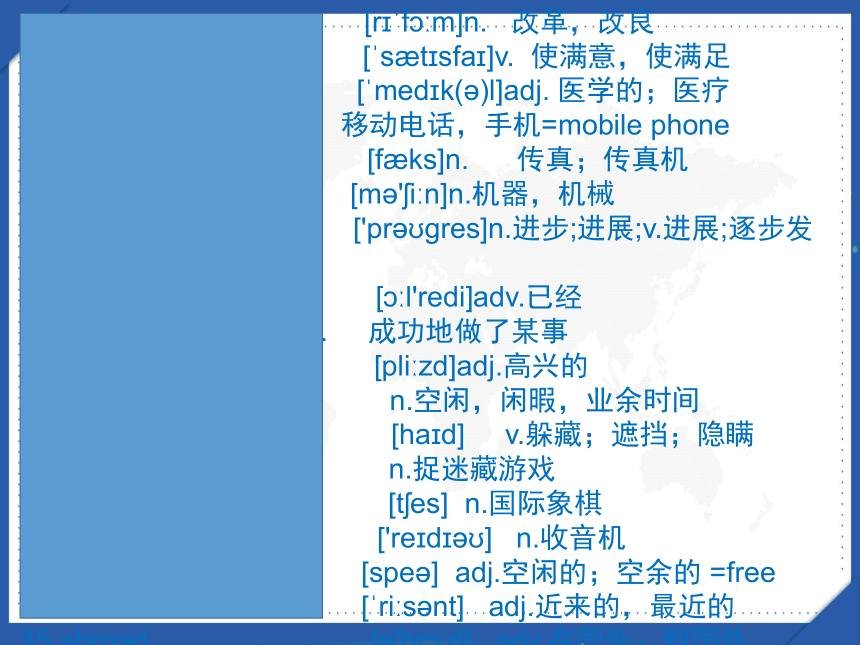
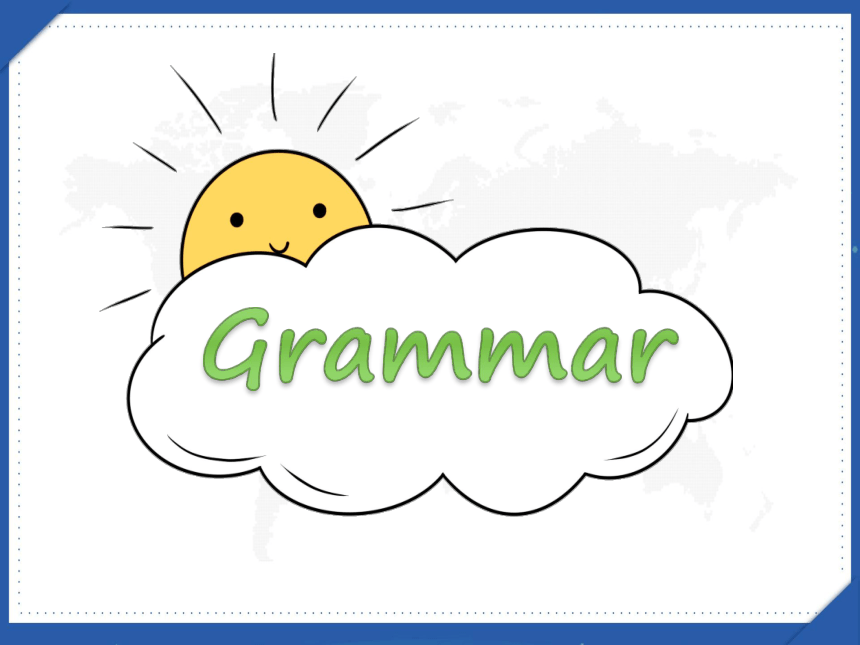
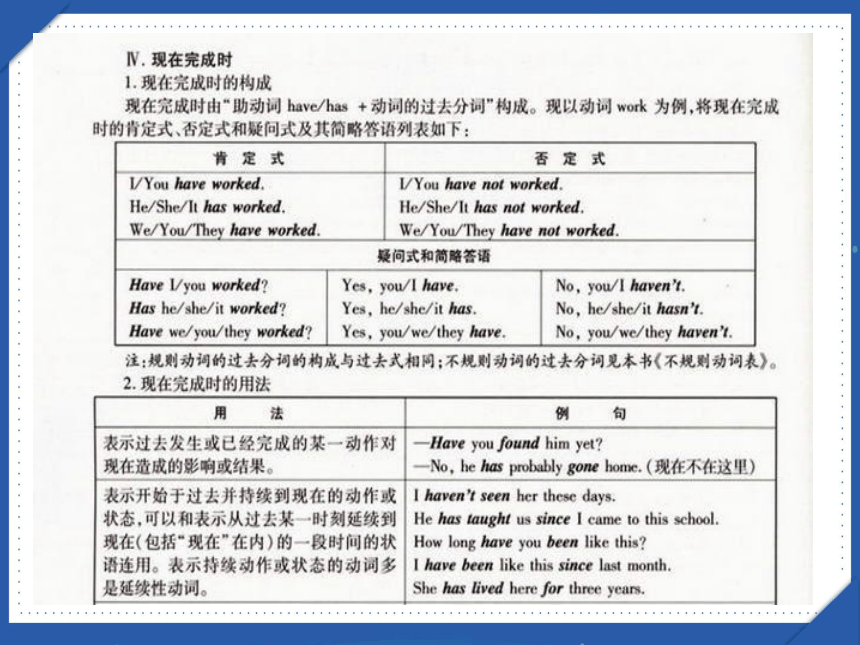
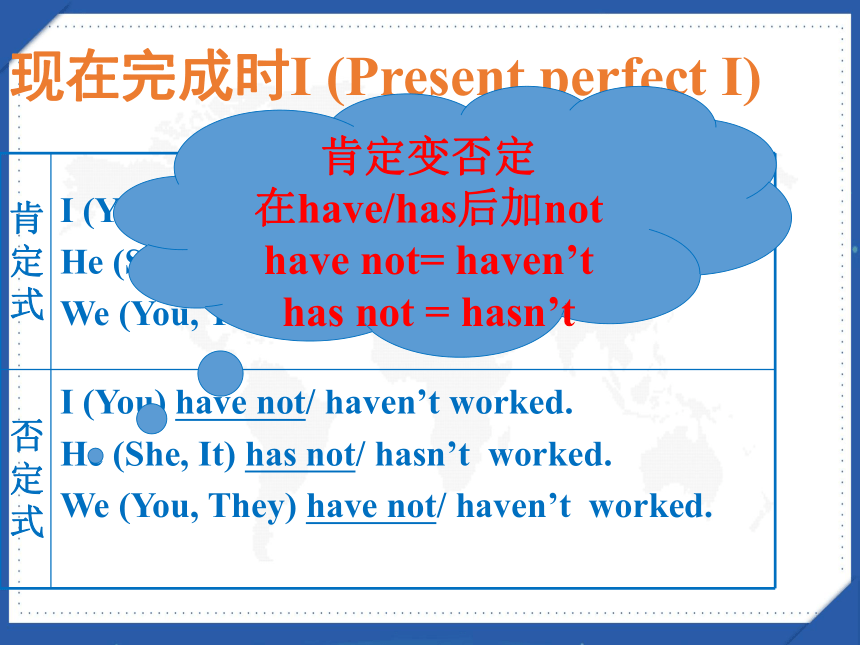
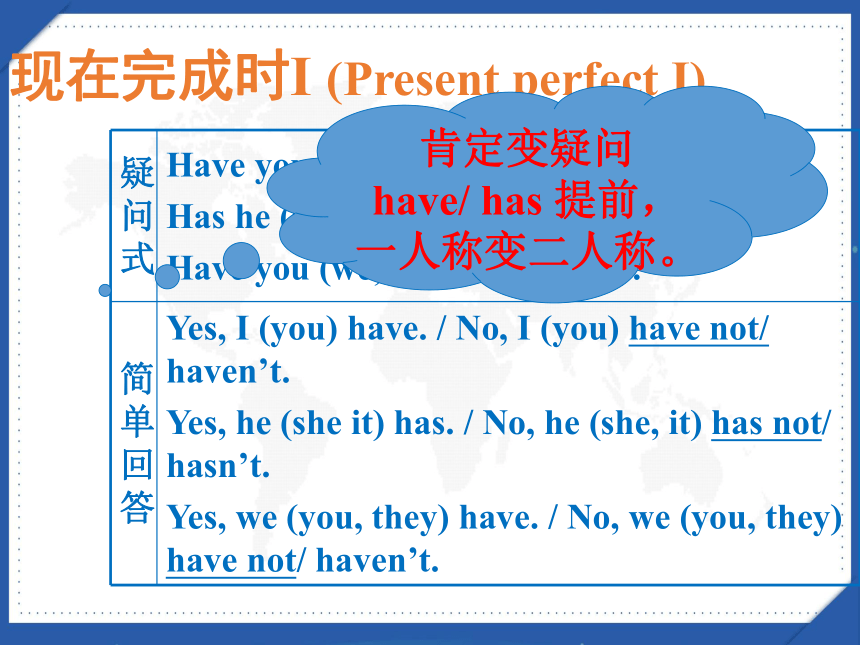
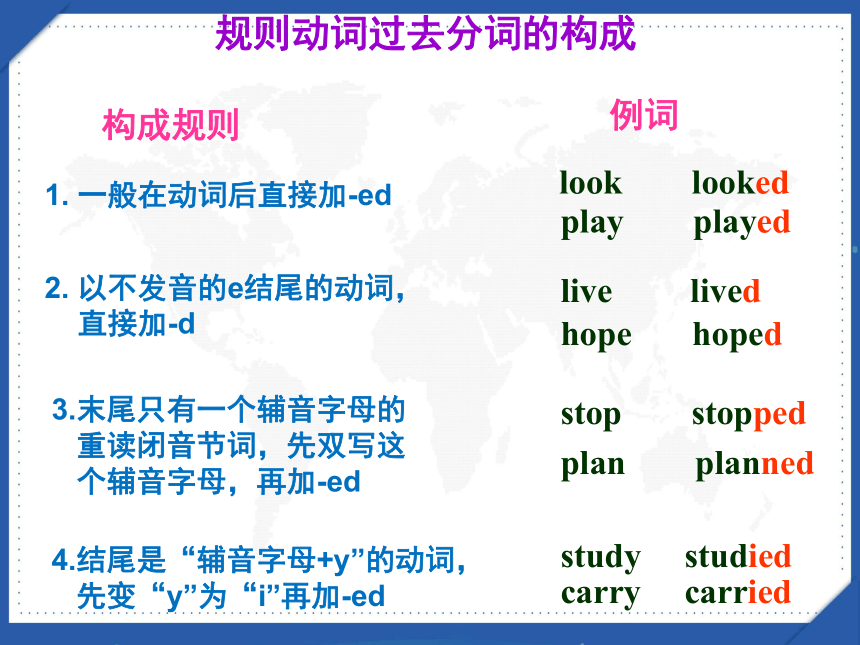

文档简介
(共66张PPT)
中考英语第一轮总复习
Unit
1
topic
1
湖北省巴东县京信友谊中学
Learning
goals
Structure
Vocabulary
Function
Talking
about
duration
Expressing
emotions
Present
perfect(1)
Have/has
done
have/has
been/gone
to
Words
for
leisure
activities
Words
for
communication
单词过关
1.take
place
[te?k//ple?s]发生,进行
(有计划)
2.volunteer
[v?l?n?t??]
n.
志愿者
3.bell
[bel]
n.
钟(铃)声;铃,钟
4.Africa
[?
?fr?k?]
n.
非洲
5.disabled
[d?s?e?b(?)ld]
adj.
残疾的,残废的
6.shut
[??t]v.
关闭,关上
=close
7.ever
[?
ev?]adv.
在任何时候,从来
8.rope
[r??p]n
绳子,绳索
9.narrow
[?n?r??]adj.
狭窄的
10.communication
[k?mju?n??ke??(?)n]n.交流;交往;通讯
11.Various
[?ve?r??s]
adj.
各种各样的;多姿多彩的
12.Report
[r?
?
p??t]
n.&v.
报告,汇报
13.keep
in
touch
with
sb.
跟……保持联系
14.relative
[?
rel?t?v]n.
亲属,亲戚
15.telegram
[?tel?ɡr?m]n.
电报;电文
16.rapid
[?r?p?d]
adj.
快的,迅速的
17.Since
[s?ns]prep.
自……以后,从……以来
18.reform
[r??f??m]n.
改革,改良
19.satisfy
[?s?t?sfa?]v.
使满意,使满足
20.medical
[?med?k(?)l]adj.
医学的;医疗
21.cellphone
移动电话,手机=mobile
phone
22.fax
[f?ks]n.
传真;传真机
23.machine
[m?'?i?n]n.机器,机械
24.progress
['pr??ɡres]n.进步;进展;v.进展;逐步发展
25.already
[??l'redi]adv.已经
26.succeed
in
doing
sth.
成功地做了某事
27.pleased
[pli?zd]adj.高兴的
28.leisure
n.空闲,闲暇,业余时间
29.hide
[ha?d]
v.躲藏;遮挡;隐瞒
30.hide
and
seek
n.捉迷藏游戏
31.chess
[t?es]
n.国际象棋
32.radio
['re?d???]
n.收音机
33.spare
[spe?]
adj.空闲的;空余的
=free
34.recent
[?ri?s?nt]
adj.近来的,最近的
35.abroad
[?'br??d]
adv.在国外;到国外
Grammar
肯定式
I
(You)
have
worked.
He
(She,
It)
has
worked.
We
(You,
They)
have
worked.
否定式
I
(You)
have
not/
haven’t
worked.
He
(She,
It)
has
not/
hasn’t
worked.
We
(You,
They)
have
not/
haven’t
worked.
现在完成时I
(Present
perfect
I)
肯定变否定
在have/has后加not
have
not=
haven’t
has
not
=
hasn’t
现在完成时I
(Present
perfect
I)
疑问式
Have
you
(I)
worked…?
Has
he
(she,
it)
worked…?
Have
you
(we,
they)
worked…?
简单回答
Yes,
I
(you)
have.
/
No,
I
(you)
have
not/
haven’t.
Yes,
he
(she
it)
has.
/
No,
he
(she,
it)
has
not/
hasn’t.
Yes,
we
(you,
they)
have.
/
No,
we
(you,
they)
have
not/
haven’t.
肯定变疑问
have/
has
提前,
一人称变二人称。
规则动词过去分词的构成
1.
一般在动词后直接加-ed
构成规则
2.
以不发音的e结尾的动词,
直接加-d
3.末尾只有一个辅音字母的
重读闭音节词,先双写这
个辅音字母,再加-ed
4.结尾是“辅音字母+y”的动词,
先变“y”为“i”再加-ed
例词
look
looked
play
played
live
lived
hope
hoped
stop
stopped
plan
planned
study
studied
carry
carried
不规则动词过去分词的构成
1.
三个主要动词
is,
am
be
are
was
were
been
have/has
had
had
do/does
did
done
2.
AAA型
(三者一致)
cut
cut
cut
let
let
let
put
put
put
cost
cost
cost
read
read
read
3.
ABA型
(过去分词与原形一致)
come
came
come
become
became
become
run
ran
run
4.
ABB型
(过去分词与过去式一致)
bring
brought
brought
find
found
found
hear
heard
heard
keep
kept
kept
make
made
made
此外还有leave,
win,
tell,
spend,
say,meet等等。
5.
ABC型
(三者不一致)
eat
ate
eaten
give
gave
given
write
wrote
written
see
saw
seen
get
got
gotten
begin
began
begun
此外还有go,
take,
know,
speak,
swim等等。
have
cleaned
the
clothes
past
now
表示过去发生的某一动作对现在造成的影响或结果。
e.g.
I
have
just
cleaned
my
clothes.
我刚洗过衣服。
(“洗衣服”是发生在过去的动作,对现在造成的结果是“衣服干净了”。)
e.g.
I
have
just
had
my
breakfast.
我刚吃过早饭。
(对现在的影响是“不饿”。)
cleaned
the
clothes
Present
Perfect
(II)
常与
just,
already,
yet,
never,
ever
等副词连用。
1.
表示已完成的某一动作对现在造成的影响或结果
1)
标志词:
already:
yet:
多用于陈述句,位于have/has后,有时位于句末。
e.g.
I
have
already
finished
my
homework.
用于疑问句和否定句,位于句尾。
e.g.
Have
you
found
your
lost
book
yet
?
I
haven't
had
breakfast
yet.
ever
:
never:
多用于疑问句,问初次经历。
e.g.
Have
you
ever
been
to
Beijing?
用于否定句,位于have/has后
e.g.
He
has
never
argued
with
other
people.
2)无标志词的:
e.g.
He
is
not
feeling
well
now.
He
has
caught
a
cold.
I
have
lost
the
key.
I
can't
go
into
my
room.
A:
Have
you
_____
seen
the
film?
B:
No,I
haven’t
___
.
Peter
has
_______
come
back
from
the
cinema.
He
likes
it
very
much.
He
says
he
has
______
seen
such
a
wonderful
movie
before.
A:
Have
you
seen
him
____?
B:
Yes,
I
have
_____
seen
him.
just
ever
yet
never
already
yet
He
has
gone
to
school.
He
has
been
to
school.
sb.
have/has
gone
to
…
某人去……了(去而未归)
sb.
have/has
been
to
…
某人去过……(去而复返)
arrive,get,come,reach
,
go+somewhere
不与for+时间段(连用)
since+时间点
have
/has
been
in
+somewhere
You
have
been
in
New
York
for
a
long
time.
for
a
long
time
came
to
New
York
present
past
sb.
have/
has
been
in...
某人一直在……
e.g.
I
have
been
in
the
new
school
for
a
week.
for
a
week
last
week
present
past
for
+
时间段
e.g.
She
has
worked
in
the
school
since
1995.
since
1995
lived
present
past
since
+时间点
Look
carefully
and
think
about
the
differences
between
since
and
for
in
1a.
Then
complete
the
sentences
with
since
or
for
and
listen
and
check.
1.I
have
lived
in
Beijing
______
three
years.
______2011.
2.
He
has
waited
for
Tom
______
two
hours
ago.
______
two
hours.
3.
We
have
learned
chemistry
___
one
month.
____
the
new
term
began.
for
for
for
since
since
since
n.化学
n.学期
He
bought
a
computer
in
2007.
for
two
years
2007
present
2009
past
since
2007
He
has
had
a
computer
since
2007.
=
He
has
had
a
computer
for
two
years.
短暂性动词
→
延续性动词
buy
→
have
5.短暂动词和
延续动词转换
短暂性动词
延续性动词
become
finish
return
go/leave
open
begin/start
end
die
close
join
get
married
be
be
over
be
back
be
away
(from)
be
open
be
on
be
over
be
dead
be
closed
be
in/be
a
member
of
be
married
短暂性动词
come
--------
get
to
know
--------
buy
--------
borrow
--------
marry
--------
catch
a
cold
--------
fall
ill
--------
延续性动词
be
know
have
keep
be
married
have
a
cold
be
ill
Fill
in
the
blanks.
1.
His
father
________
(die)
in
1992.
His
father
________________
(be
dead)
for
many
years.
2.
He
________
(leave)
the
army
because
of
a
leg
wound.
He
____________________
(be
away
from)
the
army
for
seven
years
because
of
a
leg
wound.
3.
He
________
(come)
to
Beijing
in
2003.
He
____________
(be
in)
Beijing
since
2003.
died
has
been
dead
left
has
been
away
from
came
has
been
in
4
He
________
(join)
Helpers’
Club
in
2004.
He
__________
(be)
a
member
of
Helpers’
Club
since
2004.
5.
He
________
(buy)
a
house
in
2005.
He
__________
(have)
a
house
since
2005.
6.
He
__________
(borrow)
the
car
in
2008.
He
__________
(keep)
the
car
for
one
year.
joined
has
been
bought
has
had
borrowed
has
kept
Choose
the
best
answer.
1.
His?
father?
______
the?
Party?
since?
1978.
A.?
joined
B.?
has
joined
C.?
was
D.?
has?
been?
in
2.
—How
long
have
you?
_____
here?
—About
two
months.
A.?
been????
B.?
gone??????????
C.?
come
D.?
arrived
3.
Hurry?
up!
The?
play
_____
for?
ten?
minutes.
A.?
has?
begun
B.?
had?
begun
C.?
has?
been?
on?
D.?
began
4.
My?
parents
_____?
Shandong?
for?
ten?
years.
A.?
have?
been?
to?
B.
have?
been?
in
C.?
have?
gone?
to
D.
have?
been
5.
His
uncle
______?for
more
than
9
years.
A.
has
come
here
B.
has
started
to
work
C.
has
lived
there
D.
has
left
the
university
?
翻
译
练
习:
1.我买了这块手表五年了。
2.这位老人已经死了十年了。
I
have
bought
this
watch
for
five
years.
I
have
had
this
watch
for
five
years/since
5
years
ago.
The
old
man
has
died
for
ten
years.
The
old
man
has
been
dead
for
ten
years/since
10
years
ago.
F
F
下一页
上一页
主菜单
3.他已经回来三天了。
4.我离开家乡已十年了。
He
has
come
back
for
3
days.
He
has
been
back
for
3
days/since
3
days
ago.
I
have
left
hometown
for
10
years.
I
have
been
away
from
hometown
for
10
years.
W
W
改
错
1.
The
film
has
began
for
an
hour.
.
2.
I
have
borrowed
this
book
for
two
weeks.
3.
Kitty
has
bought
a
book
since
last
week.
4.
Our
manager
isn’t
in
today.
He
has
been
to
Guangzhou.
been
on
kept
gone
had
一般过去时常与具体的时间状语连用,现在完成时通常与模糊的时间状语连用,或无时间状语。
1.一般过去时的时间状语有:
yesterday
,last
week…,一段时间+ago,
in
1980(过去时间),
in
October
,just
now,
a
moment
ago.
eg:
The
plane
took
off
ten
minutes
ago.
We
finished
our
task
last
week
.
He
____
(have)
ever
been
to
Shanghai.
She
______(go)
to
the
zoo
last
week.
I
____(have)
ever
been
to
Hong
Kong.
They
_________(not
have)
been
to
the
Great
Wall.
5.He
___________(work)
in
our
school
for
one
year.
6.
He
______(come)
to
our
school
last
year/in
2019.
7.
They
__________
(cook)
the
supper
already.
has
worked
went
has
haven’t
have
came
have
cooked
It
has
been
+一段时间+since
+从句
+It
is
+一段时间+since
+从句
It
has
been
two
days
since
they
left
=It
is
two
days
since
they
left
It
用作主语谈论时间,与since连用的两种结构
Find
out
the
differences
between
have/has
been
to
and
have/has
gone
to.
sb.
have/has
gone
to
…
某人去……了(去而未归)
sb.
have/has
been
to
…
某人去过……(去而复返)
has
gone
to
to
_________
his
English
it
is
beautiful
but
there
were
too
many
________
her
__________
has
become
more
and
more
__________
Maria
Kangkang
Jane
Rita
has
been
to
and
she
will
be
back
___________
______
to
be
a
volunteer
an
English
______
school
Mount
________
with
her
________
many
_______
near
the
home
in
______
places
India
hometown
beautiful
Huang
parents
people
summer
improve
Cuba
tomorrow
Michael:
Hi,
Maria,
long
time
no
see.
Where
______
you
______?
Maria:
I
___________
to
Cuba
to
be
a
volunteer.
Michael:
Really?
It
must
be
fun.
Maria:
Yeah,
I
enjoyed
the
work.
Do
you
know
where
Jane
________
for
her
summer
holiday?
Michael:
She
__________
to
Mount
Huang
for
vacation.
Maria:
Have
you
seen
her
this
morning?
Michael:
Oh,
she
_________
to
the
library.
Maria:
I
will
go
and
find
her.
By
the
way,
where
is
Kangkang?
Michael:
He
_________
to
the
library,
too.
Let’s
go
and
find
them.
have
been
have
been
has
been
has
been
has
gone
has
gone
1.
so…
that…如此……以至……,引导
结果状语从句。
e.g.
He
ran
so
quickly
that
we
couldn’t
keep
up
with
him.
so…that…引导的从句有时可以和too…to…句型互换。
e.g.
He
is
so
young
that
he
can’t
go
to
school.
He
is
too
young
to
go
to
school.
Language
points
2.
improve:
提高,(使)好转,改进,改善
a.
作及物动词
e.g.
He
has
improved
his
health.
b.
作不及物动词
e.g.
His
health
is
improving.
另:improve
on/upon
sth.
对……作出改进
e.g.
He
has
improved
on
the
invention.
c.
improvement
n.
改进;增进,改进的事物
1.
You
took
part
in
some
volunteer
activities
during
summer
holidays,
didn’t
you?
你在暑假参加了一些志愿者活动,是吗?
e.g.
It’s
a
nice
day,
_______
_______?
Ann
didn’t
use
to
live
there,
______
_____?
要点归纳
反意疑问句
2.
To
help
others
makes
us
happy.帮助别人使我们快乐。
e.g.
To
do
sports
every
day
is
necessary.
动词不定式做主语
isn’t
it
did
she
have
(no)
time
to
do
sth.?
有(没有)时间做某事
e.g.
He
was
so
busy
that
he
had
no
time
to
have
lunch.
他太忙了,没有时间吃午饭。
3.
Though
I
had
no
time
to
travel,
I
still
felt
very
happy.
虽然我没有时间去旅行,但我仍然感到很开心。
though/although
even
though/even
if
e.g.
Though/Although
it
was
very
late,
the
workers
went
on
working.
虽然很晚了,但是工人们继续工作。
虽然,尽管,即使
让步状语从句
通常不与but连用
1.
We
should
help
the
d________
people
when
they
are
in
trouble.
2.
—
It’s
getting
colder
now.
Would
you
please
s____
the
door?
—
Sure.
3.
He
told
me
that
he
__________
(take
part
in)
an
English
party
last
night.
4.
We
were
busy
at
that
time,
so
we
had
no
time
______
(go)
shopping.
5.
_________
(see)
is
to
believe.
isabled
to
go
hut
took
part
in
眼见为实。
To
see
Fill
in
the
blanks.
当堂训练
1.
—
_____
you
ever
_____
to
the
USA?
—
Yes,
we
have.
A.
Have,
gone
B.
Have,
been
C.
Did,
go
D.
Did,
went
2.
______
it
rains
heavily,
______
farmers
are
still
working
in
the
fields.
A.
Though,
but
B.
Though,
still
C.
Though,
/
D.
Although,
but
3.
—
I
helped
a
disabled
man
yesterday.
—
______
wonderful
experience!
A.
What
B.
How
a
C.
How
D.
What
a
4.
Jessie
learnt
a
lot
______
the
book
after
reading
it.
A.
from
B.
of
C.
at
D.
with
Choose
the
best
answer.
当堂训练
Underline
the
topic
sentence
of
each
paragraph.
Paragraph
1.
She
has
seen
the
changes
in
Beijing
herself.
Paragraph
2.
In
the
1960s,
the
living
conditions
in
the
city
were
poor.
Paragraph
3.
China
has
developed
rapidly
since
the
reform
and
opening-up.
Paragraph
4.
It
is
important
to
remember
the
past,
live
in
the
present
and
dream
about
the
future.
Topic
sentences
are
usually
at
the
beginning
or
the
ending
of
a
paragraph.
communications---simple,
slow
communications—various
,
quick,
easy
telegram
fax
machine
cellphone
=
mobile
phone
several
different
communicate
v.
Language
points
more
than
=
over
超过,多于。
后常跟数词
e.g.
more
than/
over
ten
men
more…
than…
比……更……
e.g.
I
have
more
friends
than
you.
see
sth.
oneself
亲眼所见
e.g.
I
saw
that
rare
fish
myself.
have
the/a
chance
to
do
sth.
有机会做某事
e.g.
I’ll
have
the
chance
to
visit
your
factory
next
Sunday.
not
only…
but
also…不但……而且……
连接主语时,谓语动词须和邻近的主语保持一致
e.g.
Not
only
he
but
also
I
have
been
to
Canada.
keep
in
touch
with…
与……保持联系
get
in
touch
with…
与……取得联系
lose
touch
with…
与……失去联系
You
can
get
in
touch
with
me
at
any
time
if
necessary.
如果有必要,你可以随时与我取得联系。
I’ve
lost
touch
with
most
of
my
friends
in
college.
我已经和大学时的大多数朋友失去了联系。
succeed
v.
成功
success
n.
成功
successful
adj.
成功的
successfully
succeed
in
doing
sth.
成功做了某事
have
a
success
in
sth./
doing
sth.
be
successful
in
sth./
doing
sth.
e.g.
He
succeeded
in
passing
the
exam.
He
had
a
success
in
(passing)
the
exam.
He
was
successful
in
(passing)
the
exam.
跟...保持联系
keep
in
touch
with...
改革开放
reform
and
opening
---up
取得进步
make
rapid
/great
progress
...对...感到满意
be
pleased
with...
成功地做了...
succeed
in
doing
sth
在20世纪60年代
in
1960s
满足人们的需求
satisfy
people's
needs
远离...
be
far
away
from...
尽力做...
try
to
do
sth
当堂训练
1.
He
has
lived
in
Hunan
______
(自从)
1998.
2.
If
you
are
friendly
to
others,
you’ll
have
_____________
(越来越多)
friends.
3.
There
are
lots
of
clothes
to
____________
_______
(满足人们的需求)
in
that
shop.
I
like
doing
some
shopping
there.
4.
Tom
is
good
at
sports.
He
can
_______
(不仅)
play
basketball
_______
(而且)
play
tennis.
5.
You
can
send
me
the
message
by
______
(传真).
more
and
more
satisfy
people’s
needs
not
only
fax
since
but
also
Fill
in
the
blanks.
1.
Li
Ming
has
________________
(取得很大进步)
in
English,
because
he
studies
hard.
2.
China
has
succeeded
in
_______
(send)
Shenzhou
Ⅹ
into
space.
3.
I
have
_______(已经)
had
lunch.
I
am
full.
made
great
progress
sending
already
=
I
had
no
time
to
travel,
but
I
still
felt
very
happy.
=
How
wonderful
the
experience
is!
=That’s
the
bell.
=
The
bell
is
ringing.
There
goes
the
bell.
What
a
wonderful
experience!
Though
I
had
no
time
to
travel,
I
still
felt
very
happy.
To
help
others
makes
us
happy.
I
think
it
is
important
to
remember
the
past,
live
in
the
present
and
dream
about
the
future.
make
sb./sth.
+
adj.
make
sb./sth.
do
sth.
In
the
past
At
present
playing
hide-and-seek
watching
operas
playing
cards
or
chess
listening
to
the
radio
playing
and
watching
team
sports
playing
games
on
computers
chatting
on
the
Internet
traveling
all
over
the
world
Leisure
activity
1.
Leisure
activities
play
an
important
part
in
people’s
lives.
休闲活动在人们的生活中起着重要的作用。
play
a/an…
part
in
=
play
a/an…
role
in
扮演……角色;起……作用;有……影响
e.g.
Computer
plays
an
important
part
in
our
daily
lives.
lives
life---
lives
n.
生活,生命
live---
lives
v.
居住,生活
要点归纳
要点归纳
2.
Watching
operas
and
listening
to
the
radio
were
the
main
activities
in
their
spare
time.
看戏和听广播是他们在空闲时间的主要活动。
watching
operas
and
listening
to
the
radio
是动名词短语,作这个句子的主语。
e.g.
Reading
books
plays
an
important
part
in
his
life.
e.g.
She
often
goes
shopping
in
her
spare
time.
in
one’s
spare/free
time
在某人的业余时间
要点归纳
3.
They
go
to
visit
some
places
of
interest,
and
some
people
even
make
a
tour
abroad
to
see
the
world.
他们去参观名胜古迹,有些人甚至去国外旅游。
make
a
tour
abroad
去国外旅游
e.g.
They
plan
to
make
a
tour
abroad
next
year.
abroad
adv.
在国外,到国外
go
abroad
去国外
at
home
and
abroad
国内外
be
abroad
在国外
Choose
the
best
answer.
1.
—The
farmers
in
our
village?
have?
been?
to?
the?
USA.
—Really
?
When
______
there?
A.
will?
they?
go
B.
did?
they?
go
C.
do?
they?
go
D.
have?
they?
gone
2.
We
now
______
him
by
writing
letters.
A.
keep
away
from
B.
keep
on
C.
keep
distance
D.
keep
in
touch
with
3.
Breakfast
______
an
important
part
in
our
meals.
A.
goes
B.
have
C.
plays
D.
get
4.
Miss?
Green?
isn’t?
in?
the?
office
.
She
______
to?the
library.
A.
has?
gone
B.
went
C.will?
go
D.?
has?
been
当堂训练
Thank
you
中考英语第一轮总复习
Unit
1
topic
1
湖北省巴东县京信友谊中学
Learning
goals
Structure
Vocabulary
Function
Talking
about
duration
Expressing
emotions
Present
perfect(1)
Have/has
done
have/has
been/gone
to
Words
for
leisure
activities
Words
for
communication
单词过关
1.take
place
[te?k//ple?s]发生,进行
(有计划)
2.volunteer
[v?l?n?t??]
n.
志愿者
3.bell
[bel]
n.
钟(铃)声;铃,钟
4.Africa
[?
?fr?k?]
n.
非洲
5.disabled
[d?s?e?b(?)ld]
adj.
残疾的,残废的
6.shut
[??t]v.
关闭,关上
=close
7.ever
[?
ev?]adv.
在任何时候,从来
8.rope
[r??p]n
绳子,绳索
9.narrow
[?n?r??]adj.
狭窄的
10.communication
[k?mju?n??ke??(?)n]n.交流;交往;通讯
11.Various
[?ve?r??s]
adj.
各种各样的;多姿多彩的
12.Report
[r?
?
p??t]
n.&v.
报告,汇报
13.keep
in
touch
with
sb.
跟……保持联系
14.relative
[?
rel?t?v]n.
亲属,亲戚
15.telegram
[?tel?ɡr?m]n.
电报;电文
16.rapid
[?r?p?d]
adj.
快的,迅速的
17.Since
[s?ns]prep.
自……以后,从……以来
18.reform
[r??f??m]n.
改革,改良
19.satisfy
[?s?t?sfa?]v.
使满意,使满足
20.medical
[?med?k(?)l]adj.
医学的;医疗
21.cellphone
移动电话,手机=mobile
phone
22.fax
[f?ks]n.
传真;传真机
23.machine
[m?'?i?n]n.机器,机械
24.progress
['pr??ɡres]n.进步;进展;v.进展;逐步发展
25.already
[??l'redi]adv.已经
26.succeed
in
doing
sth.
成功地做了某事
27.pleased
[pli?zd]adj.高兴的
28.leisure
n.空闲,闲暇,业余时间
29.hide
[ha?d]
v.躲藏;遮挡;隐瞒
30.hide
and
seek
n.捉迷藏游戏
31.chess
[t?es]
n.国际象棋
32.radio
['re?d???]
n.收音机
33.spare
[spe?]
adj.空闲的;空余的
=free
34.recent
[?ri?s?nt]
adj.近来的,最近的
35.abroad
[?'br??d]
adv.在国外;到国外
Grammar
肯定式
I
(You)
have
worked.
He
(She,
It)
has
worked.
We
(You,
They)
have
worked.
否定式
I
(You)
have
not/
haven’t
worked.
He
(She,
It)
has
not/
hasn’t
worked.
We
(You,
They)
have
not/
haven’t
worked.
现在完成时I
(Present
perfect
I)
肯定变否定
在have/has后加not
have
not=
haven’t
has
not
=
hasn’t
现在完成时I
(Present
perfect
I)
疑问式
Have
you
(I)
worked…?
Has
he
(she,
it)
worked…?
Have
you
(we,
they)
worked…?
简单回答
Yes,
I
(you)
have.
/
No,
I
(you)
have
not/
haven’t.
Yes,
he
(she
it)
has.
/
No,
he
(she,
it)
has
not/
hasn’t.
Yes,
we
(you,
they)
have.
/
No,
we
(you,
they)
have
not/
haven’t.
肯定变疑问
have/
has
提前,
一人称变二人称。
规则动词过去分词的构成
1.
一般在动词后直接加-ed
构成规则
2.
以不发音的e结尾的动词,
直接加-d
3.末尾只有一个辅音字母的
重读闭音节词,先双写这
个辅音字母,再加-ed
4.结尾是“辅音字母+y”的动词,
先变“y”为“i”再加-ed
例词
look
looked
play
played
live
lived
hope
hoped
stop
stopped
plan
planned
study
studied
carry
carried
不规则动词过去分词的构成
1.
三个主要动词
is,
am
be
are
was
were
been
have/has
had
had
do/does
did
done
2.
AAA型
(三者一致)
cut
cut
cut
let
let
let
put
put
put
cost
cost
cost
read
read
read
3.
ABA型
(过去分词与原形一致)
come
came
come
become
became
become
run
ran
run
4.
ABB型
(过去分词与过去式一致)
bring
brought
brought
find
found
found
hear
heard
heard
keep
kept
kept
make
made
made
此外还有leave,
win,
tell,
spend,
say,meet等等。
5.
ABC型
(三者不一致)
eat
ate
eaten
give
gave
given
write
wrote
written
see
saw
seen
get
got
gotten
begin
began
begun
此外还有go,
take,
know,
speak,
swim等等。
have
cleaned
the
clothes
past
now
表示过去发生的某一动作对现在造成的影响或结果。
e.g.
I
have
just
cleaned
my
clothes.
我刚洗过衣服。
(“洗衣服”是发生在过去的动作,对现在造成的结果是“衣服干净了”。)
e.g.
I
have
just
had
my
breakfast.
我刚吃过早饭。
(对现在的影响是“不饿”。)
cleaned
the
clothes
Present
Perfect
(II)
常与
just,
already,
yet,
never,
ever
等副词连用。
1.
表示已完成的某一动作对现在造成的影响或结果
1)
标志词:
already:
yet:
多用于陈述句,位于have/has后,有时位于句末。
e.g.
I
have
already
finished
my
homework.
用于疑问句和否定句,位于句尾。
e.g.
Have
you
found
your
lost
book
yet
?
I
haven't
had
breakfast
yet.
ever
:
never:
多用于疑问句,问初次经历。
e.g.
Have
you
ever
been
to
Beijing?
用于否定句,位于have/has后
e.g.
He
has
never
argued
with
other
people.
2)无标志词的:
e.g.
He
is
not
feeling
well
now.
He
has
caught
a
cold.
I
have
lost
the
key.
I
can't
go
into
my
room.
A:
Have
you
_____
seen
the
film?
B:
No,I
haven’t
___
.
Peter
has
_______
come
back
from
the
cinema.
He
likes
it
very
much.
He
says
he
has
______
seen
such
a
wonderful
movie
before.
A:
Have
you
seen
him
____?
B:
Yes,
I
have
_____
seen
him.
just
ever
yet
never
already
yet
He
has
gone
to
school.
He
has
been
to
school.
sb.
have/has
gone
to
…
某人去……了(去而未归)
sb.
have/has
been
to
…
某人去过……(去而复返)
arrive,get,come,reach
,
go+somewhere
不与for+时间段(连用)
since+时间点
have
/has
been
in
+somewhere
You
have
been
in
New
York
for
a
long
time.
for
a
long
time
came
to
New
York
present
past
sb.
have/
has
been
in...
某人一直在……
e.g.
I
have
been
in
the
new
school
for
a
week.
for
a
week
last
week
present
past
for
+
时间段
e.g.
She
has
worked
in
the
school
since
1995.
since
1995
lived
present
past
since
+时间点
Look
carefully
and
think
about
the
differences
between
since
and
for
in
1a.
Then
complete
the
sentences
with
since
or
for
and
listen
and
check.
1.I
have
lived
in
Beijing
______
three
years.
______2011.
2.
He
has
waited
for
Tom
______
two
hours
ago.
______
two
hours.
3.
We
have
learned
chemistry
___
one
month.
____
the
new
term
began.
for
for
for
since
since
since
n.化学
n.学期
He
bought
a
computer
in
2007.
for
two
years
2007
present
2009
past
since
2007
He
has
had
a
computer
since
2007.
=
He
has
had
a
computer
for
two
years.
短暂性动词
→
延续性动词
buy
→
have
5.短暂动词和
延续动词转换
短暂性动词
延续性动词
become
finish
return
go/leave
open
begin/start
end
die
close
join
get
married
be
be
over
be
back
be
away
(from)
be
open
be
on
be
over
be
dead
be
closed
be
in/be
a
member
of
be
married
短暂性动词
come
--------
get
to
know
--------
buy
--------
borrow
--------
marry
--------
catch
a
cold
--------
fall
ill
--------
延续性动词
be
know
have
keep
be
married
have
a
cold
be
ill
Fill
in
the
blanks.
1.
His
father
________
(die)
in
1992.
His
father
________________
(be
dead)
for
many
years.
2.
He
________
(leave)
the
army
because
of
a
leg
wound.
He
____________________
(be
away
from)
the
army
for
seven
years
because
of
a
leg
wound.
3.
He
________
(come)
to
Beijing
in
2003.
He
____________
(be
in)
Beijing
since
2003.
died
has
been
dead
left
has
been
away
from
came
has
been
in
4
He
________
(join)
Helpers’
Club
in
2004.
He
__________
(be)
a
member
of
Helpers’
Club
since
2004.
5.
He
________
(buy)
a
house
in
2005.
He
__________
(have)
a
house
since
2005.
6.
He
__________
(borrow)
the
car
in
2008.
He
__________
(keep)
the
car
for
one
year.
joined
has
been
bought
has
had
borrowed
has
kept
Choose
the
best
answer.
1.
His?
father?
______
the?
Party?
since?
1978.
A.?
joined
B.?
has
joined
C.?
was
D.?
has?
been?
in
2.
—How
long
have
you?
_____
here?
—About
two
months.
A.?
been????
B.?
gone??????????
C.?
come
D.?
arrived
3.
Hurry?
up!
The?
play
_____
for?
ten?
minutes.
A.?
has?
begun
B.?
had?
begun
C.?
has?
been?
on?
D.?
began
4.
My?
parents
_____?
Shandong?
for?
ten?
years.
A.?
have?
been?
to?
B.
have?
been?
in
C.?
have?
gone?
to
D.
have?
been
5.
His
uncle
______?for
more
than
9
years.
A.
has
come
here
B.
has
started
to
work
C.
has
lived
there
D.
has
left
the
university
?
翻
译
练
习:
1.我买了这块手表五年了。
2.这位老人已经死了十年了。
I
have
bought
this
watch
for
five
years.
I
have
had
this
watch
for
five
years/since
5
years
ago.
The
old
man
has
died
for
ten
years.
The
old
man
has
been
dead
for
ten
years/since
10
years
ago.
F
F
下一页
上一页
主菜单
3.他已经回来三天了。
4.我离开家乡已十年了。
He
has
come
back
for
3
days.
He
has
been
back
for
3
days/since
3
days
ago.
I
have
left
hometown
for
10
years.
I
have
been
away
from
hometown
for
10
years.
W
W
改
错
1.
The
film
has
began
for
an
hour.
.
2.
I
have
borrowed
this
book
for
two
weeks.
3.
Kitty
has
bought
a
book
since
last
week.
4.
Our
manager
isn’t
in
today.
He
has
been
to
Guangzhou.
been
on
kept
gone
had
一般过去时常与具体的时间状语连用,现在完成时通常与模糊的时间状语连用,或无时间状语。
1.一般过去时的时间状语有:
yesterday
,last
week…,一段时间+ago,
in
1980(过去时间),
in
October
,just
now,
a
moment
ago.
eg:
The
plane
took
off
ten
minutes
ago.
We
finished
our
task
last
week
.
He
____
(have)
ever
been
to
Shanghai.
She
______(go)
to
the
zoo
last
week.
I
____(have)
ever
been
to
Hong
Kong.
They
_________(not
have)
been
to
the
Great
Wall.
5.He
___________(work)
in
our
school
for
one
year.
6.
He
______(come)
to
our
school
last
year/in
2019.
7.
They
__________
(cook)
the
supper
already.
has
worked
went
has
haven’t
have
came
have
cooked
It
has
been
+一段时间+since
+从句
+It
is
+一段时间+since
+从句
It
has
been
two
days
since
they
left
=It
is
two
days
since
they
left
It
用作主语谈论时间,与since连用的两种结构
Find
out
the
differences
between
have/has
been
to
and
have/has
gone
to.
sb.
have/has
gone
to
…
某人去……了(去而未归)
sb.
have/has
been
to
…
某人去过……(去而复返)
has
gone
to
to
_________
his
English
it
is
beautiful
but
there
were
too
many
________
her
__________
has
become
more
and
more
__________
Maria
Kangkang
Jane
Rita
has
been
to
and
she
will
be
back
___________
______
to
be
a
volunteer
an
English
______
school
Mount
________
with
her
________
many
_______
near
the
home
in
______
places
India
hometown
beautiful
Huang
parents
people
summer
improve
Cuba
tomorrow
Michael:
Hi,
Maria,
long
time
no
see.
Where
______
you
______?
Maria:
I
___________
to
Cuba
to
be
a
volunteer.
Michael:
Really?
It
must
be
fun.
Maria:
Yeah,
I
enjoyed
the
work.
Do
you
know
where
Jane
________
for
her
summer
holiday?
Michael:
She
__________
to
Mount
Huang
for
vacation.
Maria:
Have
you
seen
her
this
morning?
Michael:
Oh,
she
_________
to
the
library.
Maria:
I
will
go
and
find
her.
By
the
way,
where
is
Kangkang?
Michael:
He
_________
to
the
library,
too.
Let’s
go
and
find
them.
have
been
have
been
has
been
has
been
has
gone
has
gone
1.
so…
that…如此……以至……,引导
结果状语从句。
e.g.
He
ran
so
quickly
that
we
couldn’t
keep
up
with
him.
so…that…引导的从句有时可以和too…to…句型互换。
e.g.
He
is
so
young
that
he
can’t
go
to
school.
He
is
too
young
to
go
to
school.
Language
points
2.
improve:
提高,(使)好转,改进,改善
a.
作及物动词
e.g.
He
has
improved
his
health.
b.
作不及物动词
e.g.
His
health
is
improving.
另:improve
on/upon
sth.
对……作出改进
e.g.
He
has
improved
on
the
invention.
c.
improvement
n.
改进;增进,改进的事物
1.
You
took
part
in
some
volunteer
activities
during
summer
holidays,
didn’t
you?
你在暑假参加了一些志愿者活动,是吗?
e.g.
It’s
a
nice
day,
_______
_______?
Ann
didn’t
use
to
live
there,
______
_____?
要点归纳
反意疑问句
2.
To
help
others
makes
us
happy.帮助别人使我们快乐。
e.g.
To
do
sports
every
day
is
necessary.
动词不定式做主语
isn’t
it
did
she
have
(no)
time
to
do
sth.?
有(没有)时间做某事
e.g.
He
was
so
busy
that
he
had
no
time
to
have
lunch.
他太忙了,没有时间吃午饭。
3.
Though
I
had
no
time
to
travel,
I
still
felt
very
happy.
虽然我没有时间去旅行,但我仍然感到很开心。
though/although
even
though/even
if
e.g.
Though/Although
it
was
very
late,
the
workers
went
on
working.
虽然很晚了,但是工人们继续工作。
虽然,尽管,即使
让步状语从句
通常不与but连用
1.
We
should
help
the
d________
people
when
they
are
in
trouble.
2.
—
It’s
getting
colder
now.
Would
you
please
s____
the
door?
—
Sure.
3.
He
told
me
that
he
__________
(take
part
in)
an
English
party
last
night.
4.
We
were
busy
at
that
time,
so
we
had
no
time
______
(go)
shopping.
5.
_________
(see)
is
to
believe.
isabled
to
go
hut
took
part
in
眼见为实。
To
see
Fill
in
the
blanks.
当堂训练
1.
—
_____
you
ever
_____
to
the
USA?
—
Yes,
we
have.
A.
Have,
gone
B.
Have,
been
C.
Did,
go
D.
Did,
went
2.
______
it
rains
heavily,
______
farmers
are
still
working
in
the
fields.
A.
Though,
but
B.
Though,
still
C.
Though,
/
D.
Although,
but
3.
—
I
helped
a
disabled
man
yesterday.
—
______
wonderful
experience!
A.
What
B.
How
a
C.
How
D.
What
a
4.
Jessie
learnt
a
lot
______
the
book
after
reading
it.
A.
from
B.
of
C.
at
D.
with
Choose
the
best
answer.
当堂训练
Underline
the
topic
sentence
of
each
paragraph.
Paragraph
1.
She
has
seen
the
changes
in
Beijing
herself.
Paragraph
2.
In
the
1960s,
the
living
conditions
in
the
city
were
poor.
Paragraph
3.
China
has
developed
rapidly
since
the
reform
and
opening-up.
Paragraph
4.
It
is
important
to
remember
the
past,
live
in
the
present
and
dream
about
the
future.
Topic
sentences
are
usually
at
the
beginning
or
the
ending
of
a
paragraph.
communications---simple,
slow
communications—various
,
quick,
easy
telegram
fax
machine
cellphone
=
mobile
phone
several
different
communicate
v.
Language
points
more
than
=
over
超过,多于。
后常跟数词
e.g.
more
than/
over
ten
men
more…
than…
比……更……
e.g.
I
have
more
friends
than
you.
see
sth.
oneself
亲眼所见
e.g.
I
saw
that
rare
fish
myself.
have
the/a
chance
to
do
sth.
有机会做某事
e.g.
I’ll
have
the
chance
to
visit
your
factory
next
Sunday.
not
only…
but
also…不但……而且……
连接主语时,谓语动词须和邻近的主语保持一致
e.g.
Not
only
he
but
also
I
have
been
to
Canada.
keep
in
touch
with…
与……保持联系
get
in
touch
with…
与……取得联系
lose
touch
with…
与……失去联系
You
can
get
in
touch
with
me
at
any
time
if
necessary.
如果有必要,你可以随时与我取得联系。
I’ve
lost
touch
with
most
of
my
friends
in
college.
我已经和大学时的大多数朋友失去了联系。
succeed
v.
成功
success
n.
成功
successful
adj.
成功的
successfully
succeed
in
doing
sth.
成功做了某事
have
a
success
in
sth./
doing
sth.
be
successful
in
sth./
doing
sth.
e.g.
He
succeeded
in
passing
the
exam.
He
had
a
success
in
(passing)
the
exam.
He
was
successful
in
(passing)
the
exam.
跟...保持联系
keep
in
touch
with...
改革开放
reform
and
opening
---up
取得进步
make
rapid
/great
progress
...对...感到满意
be
pleased
with...
成功地做了...
succeed
in
doing
sth
在20世纪60年代
in
1960s
满足人们的需求
satisfy
people's
needs
远离...
be
far
away
from...
尽力做...
try
to
do
sth
当堂训练
1.
He
has
lived
in
Hunan
______
(自从)
1998.
2.
If
you
are
friendly
to
others,
you’ll
have
_____________
(越来越多)
friends.
3.
There
are
lots
of
clothes
to
____________
_______
(满足人们的需求)
in
that
shop.
I
like
doing
some
shopping
there.
4.
Tom
is
good
at
sports.
He
can
_______
(不仅)
play
basketball
_______
(而且)
play
tennis.
5.
You
can
send
me
the
message
by
______
(传真).
more
and
more
satisfy
people’s
needs
not
only
fax
since
but
also
Fill
in
the
blanks.
1.
Li
Ming
has
________________
(取得很大进步)
in
English,
because
he
studies
hard.
2.
China
has
succeeded
in
_______
(send)
Shenzhou
Ⅹ
into
space.
3.
I
have
_______(已经)
had
lunch.
I
am
full.
made
great
progress
sending
already
=
I
had
no
time
to
travel,
but
I
still
felt
very
happy.
=
How
wonderful
the
experience
is!
=That’s
the
bell.
=
The
bell
is
ringing.
There
goes
the
bell.
What
a
wonderful
experience!
Though
I
had
no
time
to
travel,
I
still
felt
very
happy.
To
help
others
makes
us
happy.
I
think
it
is
important
to
remember
the
past,
live
in
the
present
and
dream
about
the
future.
make
sb./sth.
+
adj.
make
sb./sth.
do
sth.
In
the
past
At
present
playing
hide-and-seek
watching
operas
playing
cards
or
chess
listening
to
the
radio
playing
and
watching
team
sports
playing
games
on
computers
chatting
on
the
Internet
traveling
all
over
the
world
Leisure
activity
1.
Leisure
activities
play
an
important
part
in
people’s
lives.
休闲活动在人们的生活中起着重要的作用。
play
a/an…
part
in
=
play
a/an…
role
in
扮演……角色;起……作用;有……影响
e.g.
Computer
plays
an
important
part
in
our
daily
lives.
lives
life---
lives
n.
生活,生命
live---
lives
v.
居住,生活
要点归纳
要点归纳
2.
Watching
operas
and
listening
to
the
radio
were
the
main
activities
in
their
spare
time.
看戏和听广播是他们在空闲时间的主要活动。
watching
operas
and
listening
to
the
radio
是动名词短语,作这个句子的主语。
e.g.
Reading
books
plays
an
important
part
in
his
life.
e.g.
She
often
goes
shopping
in
her
spare
time.
in
one’s
spare/free
time
在某人的业余时间
要点归纳
3.
They
go
to
visit
some
places
of
interest,
and
some
people
even
make
a
tour
abroad
to
see
the
world.
他们去参观名胜古迹,有些人甚至去国外旅游。
make
a
tour
abroad
去国外旅游
e.g.
They
plan
to
make
a
tour
abroad
next
year.
abroad
adv.
在国外,到国外
go
abroad
去国外
at
home
and
abroad
国内外
be
abroad
在国外
Choose
the
best
answer.
1.
—The
farmers
in
our
village?
have?
been?
to?
the?
USA.
—Really
?
When
______
there?
A.
will?
they?
go
B.
did?
they?
go
C.
do?
they?
go
D.
have?
they?
gone
2.
We
now
______
him
by
writing
letters.
A.
keep
away
from
B.
keep
on
C.
keep
distance
D.
keep
in
touch
with
3.
Breakfast
______
an
important
part
in
our
meals.
A.
goes
B.
have
C.
plays
D.
get
4.
Miss?
Green?
isn’t?
in?
the?
office
.
She
______
to?the
library.
A.
has?
gone
B.
went
C.will?
go
D.?
has?
been
当堂训练
Thank
you
同课章节目录
- Unit 1 The Changing World
- Topic 1 Our country has developed rapidly.
- Topic 2 The population in developing countries is
- Topic 3 The world has changed for the better.
- Unit 2 Saving the earth.
- Topic 1 Pollution has causes too many problems.
- Topic 2 All these problems are very serious.
- Topic 3 What can we do to protect the environment
- Unit 3 English around the World
- Topic 1 English is widely spoken around the world.
- Topic 2 Some things usually have different meaning
- Topic 3 Could you give us some advice on how to l
- Unit 4 Amazing Science
- Topic 1 When was it invented?
- Topic 2 I'm excited about the things that will be
- Topic 3 China is the third nation that sent a pers
